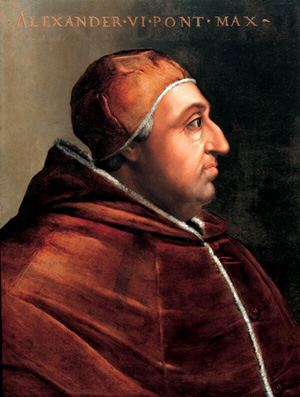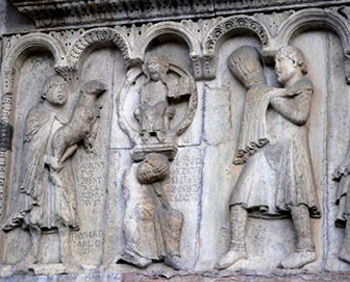 |
Traditionalist Issues
Traditionalists Should Not Use the '62 Missal
Dr. Pamela Dettman
It was very fortunate for TIA to provide its readers with the review of the 1962 Missal. I would like to remind those who might have difficulty with that review of a powerful yet often overlooked aspect of St. Pius V's Quo primum. In it he irrevocably denied the use of any other missal for anyone, save those who have had in place the "custom followed continuously for a period of not less than 200 years." How can anyone who claims to be traditionalist be irreparably attached to anything taking root in the '60s? For reorientation, St. Pius V has already provided this lesson for us.
I would like to focus on some important points concerning this 200-year corruption-buffer:

St. Pius V prevented bad Popes like Alexander VI, above, from influencing the liturgy of the Mass |
1. The 200-year safety period acknowledges the many troubles that beset the Church long before their culmination as clerical corruption and Luther's grand plan: Tolle Missam, tolle Ecclesiam (destroy the Mass, destroy the Church). Looking at the 200 years preceding Pope Pius V's decree, we can note that none of the Popes in that period have been canonized. The Holy See had abandoned Rome and the Renaissance was planting its seeds of vanity and lust for pleasure. The Church had been weakened and symptoms of this corruption surfaced in the Mass. St. Pius V certainly recognized the gradual development of Church troubles and their long-standing impact on liturgical function.
2. Clearly, St. Pius V also shows us that the liturgical corruptions themselves did not appear overnight. He demonstrates not only that corrections were needed, but also that they may have been present or developing for some two centuries. He not only removed the full expression of the deviations in existence during his pontificate, but eliminated them at their very source, two centuries earlier.
A question for the 1962 Missal proponents: How is it that we Catholics today must feel compelled to acknowledge a liturgical revolution taking over nearly the entire Catholic Hierarchy in the latter 1960s, yet at the same time believe that no evidence of what was just about to surface existed less than one decade prior? This is inconceivable! Perhaps very few can be blamed for not seeing in advance exactly what was coming. Now, however, is different. Certainly we cannot be excused after the facts have been clearly demonstrated and we have realized what could only have been a terrible nightmare less than 50 years ago.
3. Concerning all those Catholics who had been following a liturgical rite in place for more than 200 years, St. Pius V also makes the important statement that he would "in no wise rescind" their prerogatives. This concisely implements several important Catholic truths. First, it does acknowledge papal authority to rescind a prior papal pronouncement. Second, it draws a distinction between a law that can be repealed and this at hand, the immutable traditions in Divine Worship. Third, it establishes his intention to require this decree to be obeyed for all time to come, to prevent forever any future troubles in the Church from corrupting Divine Worship.
4. Lastly, let me note St. Pius V's inclusion of the word "continuously" when applying to the legitimate claim to use a particular rite. He excluded broken usage. As pointed out by Fr. Patrick Perez in his review of the 1962 Missal, the first modernist change to Catholic worship was this "broken usage" made via the error of archeologism, returning (as was claimed) to a "primitive usage." I am referring to the change in the Holy Week liturgy that was approved by Pius XII in the 1950s. This, of course, missed the “continuous” designation by about 13 centuries. As explained by Fr. Perez, this claim to a primitive usage was false anyway, and it was the same Pius XII who practiced archeologism after having condemned it.
The counterfeit argument of being a valid Missal
Again, I question the proponents of the 1962 Missal: If the 1962 Missal (or God forbid the Novus Ordo) is valid, does this validity guarantee us spiritual benefit? May we all consider the following:
The only sacrifice that is acceptable to God is that which is provided by God. God is under no obligation to accept anything else we humans may offer. But will He? Will God be pleased with a valid sacrifice, made by a valid priest, but offered outside the confines of His proscriptions? We have some reason to doubt. How can this be? Let me propose the "Orthodox" as an example, to use as a template for assessing similar circumstances.
The schismatic Eastern churches, who like many clergy and laity of our day, reject the true Catholic papacy as defined at Vatican Council I. Yet thus far, the Catholic Church recognizes as valid the apostolic succession and sacraments offered in this separated and heretical "Orthodox" church (in as much as they have not altered their rites as did the Anglicans).

Cain and Abel both offered valid sacrifices, but God only accepted the latter's
Portal of Modena Cathedral, Italy |
Their actual condition, though illicit, may still be "valid." Would not, then, the followers of this false church benefit spiritually from these valid orders and sacraments? The answer is: no. Let us listen to Abbot Gueranger describe the state of the "Orthodox" schismatic church:
"She is motionless and sterile as a branch severed from the trunk. She retains, like so many withered leaves, the ancient forms of her liturgy ... the lifeless schism of the East, so scrupulously keeping up the ancient forms which are its condemnation, and making a parade of vestments which sits so awkwardly on rebels. What life can the members of such a Church derive from these dead forms of worship?"
Let us Catholics all remember with fear and humility what preceded the first murder: God's rejection of Cain's deficient sacrifice. It is far better to be the prodigal son, who admits the error of abandoning his father's house and returns home to his brother's side than to be Cain, who hates his brother and in a jealous rage displays the murder in his heart.

Posted September 21, 2007

Related Topics of Interest
 The Missal Crisis of '62 The Missal Crisis of '62
 Quo Primum vs Novus Ordo Mass Quo Primum vs Novus Ordo Mass
 The Motu Proprio, after the Emotions The Motu Proprio, after the Emotions
 The Six Marks of the Novus Ordo Mass The Six Marks of the Novus Ordo Mass
 The Cheese in the Mousetrap The Cheese in the Mousetrap
 Lifting the Ban on the Tridentine Mass Lifting the Ban on the Tridentine Mass
 The Abomination of Desolation in Machabees and in the Present The Abomination of Desolation in Machabees and in the Present
 Pan-Religious Ceremony at St. Peter's Basilica Pan-Religious Ceremony at St. Peter's Basilica
 Crisis in Catechism Crisis in Catechism
 The New Mass: A Flavor of Protestantism The New Mass: A Flavor of Protestantism

Related Works of Interest
|
Traditionalism | Hot Topics | Home | Books | CDs | Search | Contact Us | Donate

© 2002- Tradition in Action, Inc. All Rights
Reserved
|
 |
|